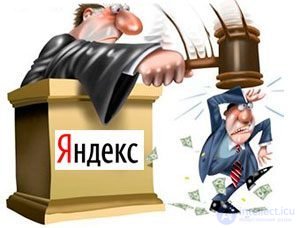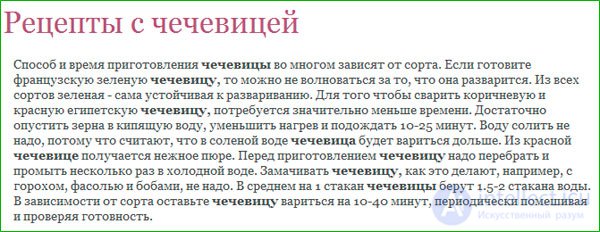 If in attempts to improve the position of the site you have already made changes to the texts many times (changed the density, reduced / increased the volume of characters, rewriting, etc.), but never saw noticeable results, it is possible that your site has been sanctioned for perespam.
If in attempts to improve the position of the site you have already made changes to the texts many times (changed the density, reduced / increased the volume of characters, rewriting, etc.), but never saw noticeable results, it is possible that your site has been sanctioned for perespam.
Since September 2011, an algorithm has been working in Yandex that recognizes and reduces the output of a page with re-optimized texts. According to my observations, this algorithm differs significantly from a two-year old tail filter, which at one time performed the same task.
Here are the main features of the algorithm that I noticed:
1) Penalties for penalties are imposed on individual pages, and not on the site as a whole. At the same time, in most cases, the page loses positions on all requests, and not only on request, where spam is observed (the tail filter only superimposed on the request-document pair, the non-recrawled requests remained in the top).
2) In some cases, when imposing sanctions, there is a gradual subsidence of the entire site (not just individual pages). This can be explained both by the presence of strong internal relationships between pages (the weight of links from pages that are under sanctions is reduced) and by the general deterioration of the PF (for example, due to the disappearance of spammed pages from the top, the total CTR of the site is getting worse).
3) The approach to the concept of spam text in Yandex has changed somewhat since the days of the “ported filter”. The filter for footcloths was superimposed when a certain threshold of keev density was exceeded in a document, which, in most cases, could be noticed even with the naked eye without deep analysis. With the current algorithm, the reason for imposing sanctions is not always obvious - there are cases when pages with texts suffer from sanctions, where Kei are used extremely rarely or are completely absent in their pure form. I think the influence of the PF is taking place here (why I think so - later in the article)
4) Although the warning of Yandex focuses solely on perespam in the texts, the cause of the imposition of sanctions may be other signs of internal optimism. From personal experience - these can be meta tags, page titles, internal linking, ALT attributes of pictures.
If you suspect that your site has been downgraded for re-spam, the first thing I advise you to do is to confirm or deny the suspicions by contacting Yandex in support. Ask Plato whether the site is really sanctioned - and in a couple of days you will know exactly how to proceed - to fight perespam, or look for the reason in something else.
Yandex’s response, which confirms the imposition of sanctions, usually looks like this:
Hello, ____!
After checking your site, our algorithms found pages, the content of which can negatively affect the ranking. On your site were indexed pages containing lists of search queries, that is, fragments of text intended not for users, but solely for promoting the site in search engines. Due to the fact that for many requests Yandex cannot correctly rank such pages, your site has been downgraded in the search results.
If these elements of the pages are not vital for the existence of the site, please remove them or change them so that they are easy to read by users. Since the site is evaluated comprehensively, we recommend checking both the texts themselves and the tags (including the title tag), and the links - all that matters for algorithms.
After making changes, write to us again, and we will consider the possibility of lifting the sanctions from your site.
-
Sincerely, Plato Schukin
Yandex support servicehttp://help.yandex.ru/
If you received just such an answer, look for signs of re-spam on your website. Let's take a closer look at where and what to look for.
Spam text - the main reason for the imposition of penalties for re-spam
Since this is the most common cause of sanctions, consider it first. The text can be identified by spam robots for various reasons:
A) Excessive use of keywords in the text is a traditional reason.
Many optimizers cannot get rid of the idea that good text is SEO text, and they try to embellish the content with all sorts of keyword turns and cases in precise and diluted entries. Try to compare your texts with competitors, as well as simply evaluate them from the point of view of the visitor (ask your wife, brother, mother, etc. to read the texts).
If it turns out "oil oil" - the texts need to be changed. At the same time, I advise you to completely change the text to a new one, and not to shamanize with a decrease in the density of words / synonyms / index, etc. And it is better to order new content not from an SEO copywriter, but from a regular one who understands sense in selling texts.
B) The senseless selection of keywords by the attributes strong, b, i, etc. Initially, the selection is intended to help users navigate the text. But random stronghas throughout the text do not help to place meaningful accents and have nothing to do with convenience:

If you fall under the filter for re-spam, it is better to completely remove all selections in the text.
C) The use of spam constructions of keywords in texts.
If the text contains keywords like "plastic windows to buy", "food delivery at home", "taxis cheap Moscow" and the like - you must immediately get rid of them. It will be much more pleasant to sound: “buy plastic windows”, “food delivery to the house”, “inexpensive taxis in Moscow”, etc. In my experience there was a case when the sanctions were lifted precisely after all spam constructions were replaced with normal ones.
D) Excessive use of text headers.
The allowable number of titles is determined by logic and depends on the length of the text. If the text size is about 1000 characters, and each paragraph has a heading h1 with keywords, spam is obvious. Personally, I have recently been trying to use h1 no more than once, and for commercial sites I generally refused to use h2-h3.
D) The lack of any meaning in the text.
I share two types of meaningless texts :
- unreadable, illiterate, uninteresting content, which I usually call "mnogabukof with efficiency = 0". Such texts can often be found on commercial sites in the “news” or “corporate blog” section, where they are posted with an enviable regularity by a regular rewriter or optimizer for extra money. What do you think, why? It's simple - to create for search engines the appearance of frequent updates on the site;
- normal readable text that users simply do not need visitors to the page. Such texts can often be seen on the pages of online stores under the product catalog below, where no adequate user usually gets. It should be noted that it is not so much the fact of the presence of these texts that is dangerous, but the use of keywords and their clarifying extensions, which can be displayed in snippets and attract untargeted traffic, worsening the PF page (a combination of Keev and PF, which I wrote above).
I will explain with an example. The online store has a text on the page with the Atlas refrigerators catalog that contains the words “repair” and “instructions”. As a result, the site gets to the top on requests related to the Atlas instructions for refrigerator repair, and visitors start visiting the site on this request. But there is no information on this request on the site. The result is a 100% return of users to the results of the issue, deterioration of the Pension Fund and, as experience has shown, a signal to impose sanctions for the spam text. Is the text in this case spam from the traditional point of view? Not. Is it useful for visitors who go to the site on request "repair refrigerators atlas instruction"? The answer is obvious.
What to do in this case? The surest way is to revise the semantic core and remove queries that users do not receive the necessary information. If these requests are fundamentally important for you or your customers - then prepare a page / section where information on the request will be provided in full, and refer from the texts to this section.
For what else can you get sanctions for perespam
Since the algorithm that reduces the overwriting of texts, in our practice there have also been cases where the main reason for the imposition of sanctions was not only in texts. This is also worth mentioning.
A) Internal relink.
In general, internal re-linking in most cases helps a lot to improve the position on the midrange, but only if it is done without fanaticism. The use of spam constructions in anchors, links from the texts of internal pages to the main page with different anchors, an excessive number of automatically placed internal links can lead to the opposite result. If you are under the filter for re-spam and your linking corresponds to the above description, I advise you to remove it.
B) Title pages.
A hint of the Title is usually contained in a letter to Yandex confirming the re-spam (read above). First of all, you need to pay attention to the length of this attribute (the more concisely - the better) and the presence of keyword listings separated by commas. If necessary, replace the current Title with an informative, concise, enjoyable to read Title.
C) Meta tag Description.
Just before the new year in our practice there was a case when the site came under the filter for re-spam. Replacing texts, simplifying relinking, optimizing title for the user did not help. Then, by chance, we noticed that instead of the normal content, a descriptive piece of text from the site settings in the CMS with comma-separated characters was registered in Desctiption. As soon as we fixed it - the site came out of the sanctions.
D) Attributes of pictures ALT and TITLE.
There was also a case with a site sent for an audit. There were very few texts on the site, they did not contain keywords, but Plato confirmed sanctions for over-sleeping. “Cure” the site was helped by revising the content of the attributes of the pictures - before that for all pictures (of which there are more than 10 on each page) the keywords were written in all the attributes of alt and title.
I can not say that the list of possible reasons I listed for the re-spam of the site is exhaustive - rather, on the contrary. Each case is individual, problems can be both obvious and those that require a lot of time and analysis to identify. The best advice I can give if you are punished for re-spamming - while you analyze the site and look for the reason for the sanctions - do not think about SEO, think about the perception of the site by users. And then, perhaps, you will be able to solve the problem and get a reward in the form of a response from Plato with the following content:
Hello, _____!
The reason why your site was lowered in the search results was eliminated by you. Soon his ranking will be restored.
-
Sincerely, Plato Schukin
Yandex support servicehttp://help.yandex.ru/


Comments
To leave a comment
seo, smo, monetization, basics of internet marketing
Terms: seo, smo, monetization, basics of internet marketing